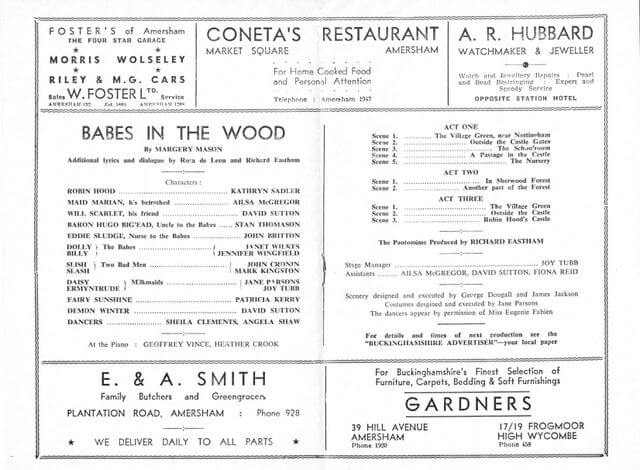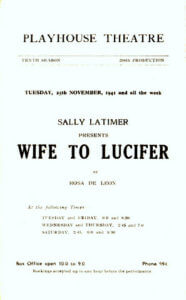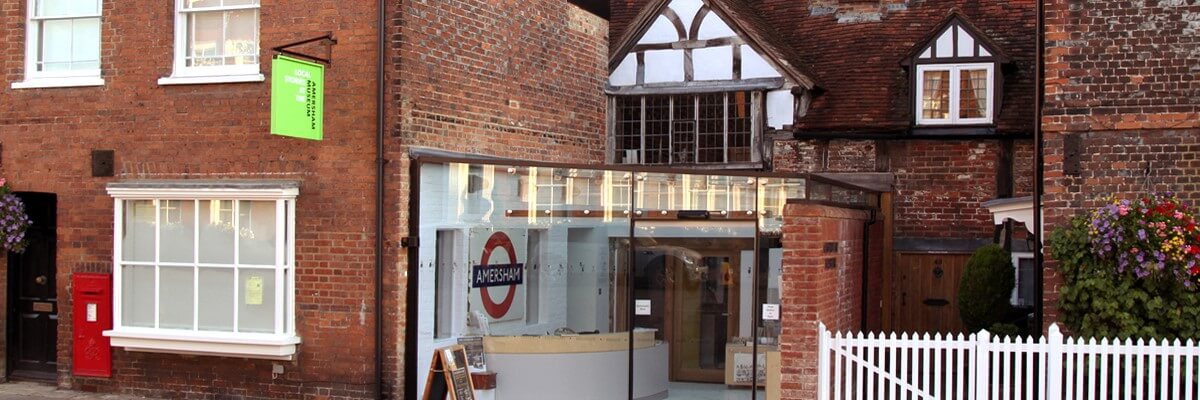This article was written by Phil Hignett, a volunteer at Amersham Museum who has been digitising the Museum’s collection of Playhouse programmes in 2015.
The Amersham Playhouse Theatre, which occupied what are now the auction rooms at Station Parade, had effectively two lives. The first ran from 1936 to the theatre’s closure in 1949. However, thanks to the husband and wife team of Rosa de Leon and John Ferris, who sold their house and sunk all their capital into buying the theatre, it reopened on 6th September 1949 with a production of ‘The Barretts of Wimpole Street’. After more than 300 productions with around 2500 performances this second life ended with the Christmas pantomime ‘Babes in the Wood’ and the theatre’s final closure at the very beginning of 1956. In addition to many programmes of the earlier period, Amersham Museum currently holds 126 Playhouse Theatre programmes, dating from April 1950 to December 1955, with the densest coverage through 1954 and 1955. Each week in the programme the Ferrises would write an open letter to their patrons, sometimes just a few lines about the current and future productions, but often a more revealing piece about their fears and frustrations, artistic and financial, as they struggled to keep the theatre open. Some 60 years later the programme notes can give us an insight into their efforts to cope with a period of rapid social change.

A regular weekly audience of around 1000 was needed to maintain the theatre. With a seating capacity of 225 and initially 8, and towards the end 7, performances a week that implied a seat occupancy of about 60%, no mean aspiration for a small theatre in a small town. This has to be seen against the backdrop of the late 1940s and early 1950s, when the country’s economy was struggling to recover from the Second World War; rationing was still in force, indeed food rationing would not end completely until 1954. In an article for the Chiltern Magazine in 1951, Rosa de Leon commented that the severe winter weather of 1947-48, and the cutting of the petrol ration in early 1949, had both contributed to the first closure of the theatre. The Ferrises seemed to be assuming that their likely patrons would be sufficiently affluent to have the mobility afforded by a car, but severe winter weather would repeatedly give them major problems with poor audiences. In February 1951 they reported –
– We have been hit hard by the snowy weather at the pantomime period, also by the influenza epidemic, and an uphill fight is before us to make good the loss sustained.
Two years later, by which time the initial programme price had doubled from threepence to sixpence, comes the comment –
– The recent bad weather and the other enemy, influenza, have taken toll of our audiences of late.
Again, a year later in February 1954 we hear –
– We have to report a sad falling away of audiences of late, due to the recent freezing weather …. we hope most fervently that the weather conditions will be less severe, for we cannot maintain the life of the theatre unless attendances improve.
In January 1955 the same story –
– Once again we have been dealt a mortal blow, this time by the cruel hand of Winter, which struck suddenly in the middle of last week, and reduced our business to nil. Icy roads, snow and slush, temperature below freezing point, all conspired to prevent our patrons from visiting the theatre, with the sad result that the fortunes of our theatre are most seriously affected …. we simply cannot continue to run a theatre with such appalling attendances.
By March little had improved –
– the long drawn-out wintry weather conditions having taken their toll of our audiences during the past two or three weeks, we imagine you can guess the existence of the theatre is once again ‘on the danger list’.
In their attempt to establish a regular, viable audience the Ferrises staged a catholic set of productions ranging from Shakespeare to Agatha Christie, through the likes of George Bernard Shaw, Somerset Maugham, Terence Rattigan, Tennessee Williams, Noel Coward and many others whose names are now no longer well known. Despite this they regularly voiced their frustration at being unable to decide exactly what the public wanted to see. In February 1952 they tried to give their patrons what they asked for –
– We are going to ask you, our audience, to choose four plays in succession that you would like to see us present. These may be plays we have done already, that you would like us to repeat, or plays that we have not yet presented. We will choose the four plays that get the most votes, in order of popularity …. Your entries for the play-ballot continue to come in, and they are intriguing us vastly. The results will be most interesting and unexpected, we feel sure, but we assure you that the four plays you vote for will be presented according to popularity. The preference seems definitely to be for serious plays, which frankly puzzles us, as we do not get great support from the public in general when we present serious plays.
By April 1953 the issue had not gone away –
– One of the chief problems that beset the theatre manager these days is how to please the largest number of playgoers, in other words, what plays will attract the public? We ourselves have presented, as you well know every kind of play in the world in our efforts to keep our audiences interested …. What has surprised us therefore, was to find that the most popular play for the last six months and consequently the best week for the theatre, was last week’s production of Murder at the Vicarage! …. We do ask you all to maintain your interest in the theatre each week, …. one good week in six months is surely not the best you can give us?
The pain felt at the failure of a serious play to attract an adequate audience is all too clear in September 1953 –
– We feel we must make some brief reference to last week’s production of Saint Joan, merely to thank those of you who came and paid tribute to our courage in presenting it, and praise the noble work of our artists and producer, also to express our great and deep surprise and sorrow that the play was so badly supported. For all the hard work and courage was wasted, we had the worst week of the season. Perhaps some of you can tell us why, for we are too grieved to think. We feel, as I am sure you will understand, that we deserved better from our district than this. A great and terrible loss.
Frustrations over the continuing difficulty of striking the right note with the audience start to appear in a high sensitivity to perceived criticism. In June 1954 we are told –
– We think we should make it quite clear, with regards to all the heavy publicity given in the local paper by the Editor, that it is we who have suspended the weekly reports of our shows in our own interests. This is a merely a protest against the damaging and unfair reports given us of late, and in no way concerns the freedom of the Press. We have asked for a change of reporter, and until we are criticised by one who has more experience and wields his pen with tact and diplomacy, we are suspending the reviews.
By 1955 the financial pressure is clearly becoming very considerable and is mixed with further pleas to find out what the public really wants. In February of this year –
– We have never been able to discover what plays Amersham likes best …. However many people tell us they don’t like comedies, it is usually the latter that pays best …. But it can only go on if enough support is given …. One solution lies with the Local Council. Why do they continue to turn a deaf ear? A farthing rate would more than help, it would give the theatre life. In most towns of this country, the Local Council not only give subsidies but also buy the theatre buildings themselves …. Many of you will no doubt have read a recent letter in our local paper from an amateur actor who is also an official of the British Drama League, in which he questions our standard of productions and also wonders if our recent misfortunes could be caused by the very commercial plays we present. And no doubt you will all laugh, as we did, at this ridiculous charge, when it may be recalled that we have for over five and a half years presented the best plays of the contemporary stage, and also won artistic laurels with our classical productions. The high cost of these presentations has for the time being made it necessary to abandon such plays, as they were not supported by the public in sufficient measure.
The severity of the strain felt by the Ferrises is made clear in April –
– We were shattered to find that the beautiful production of ‘A Day by the Sea’ was dismissed by our Editor-Critic as being just ‘words, words, words’. Yes, but what words! The same might be said about Shakespeare or the Bible …. We comfort ourselves with the fact that our own audiences agree with the London critics.
Very shortly after this it was announced that Rosa de Leon and John Ferris were to take a 12 week break and their friends Terence O’Ryan and his wife Daphne Hope would take over temporarily as managers –
– It has become imperative that things would become too much for us unless we had a break from managerial duties.
On returning to the fray in the summer of 1955 the Ferrises immediately take up a familiar theme with some tart comments –
– The varied response to last week’s production (Time Remembered by Jean Anouilh) brings us once more to the question of what plays the public really want to see. It is extremely refreshing sometimes to present an unusual type of play, as a change from the conventional comedy ‘straight from the West End’. But as this usually means a drop in box office receipts, the poor managers of small repertory theatres have to ‘play safe’ which means the constant strain of finding new releases from the London shows. We have been attacked sometimes from certain quarters for putting on these ‘stale commercial successes’ but if these accusers had to find a weekly salary bill of nearly £100 (equivalent to about £2500 today) they might think twice before embarking on a course of rare and strange foreign dramatists.
Matters were rapidly coming to a head in September of 1955 when, as reported by the Buckinghamshire Advertiser, at the end of a production of ‘Both Ends Meet’ Rosa de Leon came on to the stage to say goodbye to the audience; the theatre was to close because of half-empty houses and continuous heavy expenditure . However, there was a dramatic intervention when a regular patron, a Mr. R.I. Forbes of Chalfont St. Peter, went on to the stage to propose the formation of a Supporters’ Club to guarantee the theatre’s finances with a regular subscription. It appears about 30 people did attend a subsequent open meeting, but this was a long way short of the 500 or so it was thought necessary, with an annual subscription of £1. Nevertheless, after a break of three weeks, the theatre reopened with a production of ‘The Lady of the Camellias’. The Ferrises were initially optimistic –
– Our theatre, as you see, has been given a reprieve, due entirely to the efforts of a group of enthusiastic patrons who came forward at the end of our last production and refused to accept the fact that the theatre was finished. Through their faith and their help a new Supporters’ Club has been formed and we are asking all our patrons to subscribe and become members. In this way alone can we be given funds to continue production.
Within a week the black humours had returned –
– We were distressed beyond measure to find such poor attendances last week for our very lovely Lady of the Camellias. Is it to be established once and for all that the public want to laugh more than anything else? We have always found better receipts at the box office for a funny play than a drama, be it ever so well staged and played …. We have decided to postpone our production of ‘The Merry Wives of Windsor’ having found that the cost of the show would be far in excess of what we can afford.
The programme for the last production, the Christmas and New Year pantomime ‘Babes in the Wood’, had a poignant blank space where the next production would normally be announced. At the end of the last performance, on 7th January 1956, the role of television in the theatre’s demise was given explicit reference. A year earlier the Ferrises had voiced their concern over the growth in the popularity of television –
Please continue to keep up your attendance during the next year, also to try and interest others in the little Playhouse, which has endeavoured for over five years to keep live drama going in the face of the grave threat of Television. Many theatres all over the country have had to close their doors.
The Buckinghamshire Advertiser reported that Rosa de Leon had the character of Robin Hood speak the following exit lines at the end of the last performance –
– It is time to say goodnight again, now our show is through. We hope we have not failed to entertain our friends: and now, a gift from the Christmas tree – a cheerful thought we bring; when the world has finished with TV, they will find the play is the thing.
The last rites of the theatre did not pass without acrimony. A foreclosure order had been made after the theatre had fallen behind in mortgage payments. The Advertiser reported the Ferrises had been attempting to sell the theatre to a local businessman, who had applied for permission to turn the premises into a plastics factory, initially refused but in the course of appeal. A figure of £6000 was mentioned as the amount the Ferrises had originally committed to purchase the theatre. Reports that offers from the Supporters’ Club and Wycombe Repertory Theatre to buy the theatre had been rejected were vigorously denied by the Ferrises, who maintained that only a sale for industrial purposes would produce the required sum. That the theatre did not subsequently become a plastics factory is self-evident, although the premises were finally sold. A rather petulant remark in a letter to the Advertiser by Rosa de Leon blames the theatre’s demise on the public –
– We had already warned the public in October last that, unless support was better, the theatre would die. All told the Playhouse has been operating for more than twenty years. What more opportunity could the area be given?
Perhaps the Ferrises had misjudged their potential audience. In 1951 fewer than 1 in 10 households had a television, by 1956 this had risen to 1 in 3. The very people who could afford the mobility and disposable income of regular theatre-goers could also afford an early acquisition of a television set. Independent Television had launched the country’s second channel in the London area in September 1955. The Advertiser reported that ITN announced the closure of the theatre –
– With a rather wry smile the announcer (Robin Day) said that Miss Rosa de Leon had stated that ‘television has taken half our audiences’. He added: ‘And that – I am afraid – is the end of the news’.
Ironically, throughout this second life of the theatre the programmes carried advertisements for local shops selling …. televisions.
Further research by Alfred Armstrong (book collector and amateur researcher, https://oddbooks.co.uk ) has found that Rosa de Leon was born Bertha Gabrielle Hyman in West Ham in 1901. She and John Ferris rented Red Lion House in the High Street and John apparently did a lot of work on the property, restoring it to a habitable state from semi-dereliction. His labours were taken into account by the owners of the house who a few years later sold it to the couple at a discount. Her professional name was presumably taken from the name of the house.
 They were regular enthusiastic theatre-goers in the Latimer/Jenner years, and Sally Latimer encouraged Rosa to write her first play Wife to Lucifer which was performed at the Playhouse in 1941. In 1978 Rosa wrote One Phoenix Died, her memoir about the Amersham Playhouse under her new name of Linda Morgan Bain. She also wrote a biography of Frank Harris, which is how Alfred came to have an interest in her. She died in 1980 and was buried in Bognor Regis Cemetery.
They were regular enthusiastic theatre-goers in the Latimer/Jenner years, and Sally Latimer encouraged Rosa to write her first play Wife to Lucifer which was performed at the Playhouse in 1941. In 1978 Rosa wrote One Phoenix Died, her memoir about the Amersham Playhouse under her new name of Linda Morgan Bain. She also wrote a biography of Frank Harris, which is how Alfred came to have an interest in her. She died in 1980 and was buried in Bognor Regis Cemetery.

